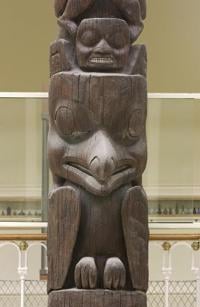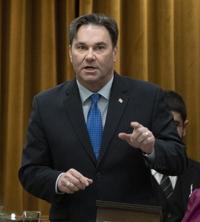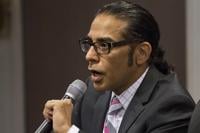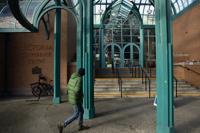LAXGALTS'AP, B.C. - Children placed cedar boughs on the ground in front of a memorial totem pole to allow people to take a closer look without touching the long-lost treasure.
Hundreds of people took the cedar path walkway Friday during a celebration in British Columbia's remote northwest that marked the coming home of the Nisga'a Nation's memorial totem pole stolen and sold to Scotland's ║├╔źtv Museum almost 100 years ago.
The memorial totem was carved to honour one of Amy Parent's relatives more than 160 years ago.
Parent, a Canada Research Chair in Indigenous governance and education and an associate professor at Simon Fraser University, was one of the driving forces behind its return to its homeland.
ÔÇťWelcome home, dear ancestor. It's been a journey," she said during the ceremony. "My heart is so happy to be here with you today."
The 11-metre, red-cedar pole was taken in 1929 by an ethnographer researching life in the Nisga'a Village.
Parent said the Nisga'a travelled to Scotland two decades ago to ask for the return of the totem, but the museum said then that it was in rough shape and couldn't be moved. But they persisted, and last year, the museum agreed to the transfer home, she said.
Parent said in meetings they had in Edinburgh with museum officials, its board and the government of Scotland, the Nisga'a stressed that the "reason for coming to Scotland was we wanted our children to be able to wake up every day and not have to work so hard to learn about the story of who we are."
The Nisga'a told Scottish officials they wanted the spirit of the totem to be free in its homeland and be connected to where it belongs, she said.
Parent said she was convinced the presence of curious children at the ║├╔źtv Museum of Scotland when the Nisga'a delegation arrived helped them bring the totem back to B.C.'s Nass Valley.
The children asked the Nisga'a about their songs, their language and the story of the totem, she said.
"Children have an innate sense of justice and they know the difference between right and wrong," said Parent. "It didn't take very long for the children to come up to us and to send their parents to us and ask, 'What language are you speaking, what songs are you singing?'"
The totem belongs to the House of Ni'isjoohl from the Ganada, or frog clan. The clan's matriarch Joanna Moody commissioned a master carver in 1860 to honour her family member Ts'awit, a warrior who died protecting his family.
John Devine, a representative of the Scottish government in Canada, told the crowd the totem's return could lead to more honest relationships between First Nations and other countries that have Indigenous artifacts.
ÔÇťFor Scotland, this was not just about the process of returning a memorial pole, it was a decision to right a historical wrong.ÔÇŁ
But for Eva Clayton, the Nisga'a Nation's president, the return signifies both truth and reconciliation.
"Because when we think about truth and reconciliation tomorrow, we relate it to the artifacts that were taken without our consent, it brings a lot of emotions," Clayton said of Saturday's celebration of Truth and Reconciliation Day in Canada.
The day is in recognition of the survivors of the harsh cruelties of Canada's residential schools and to remember that many children didn't come home.
The pole remained in a crate in a Nisga'a hall on Friday and will be erected later in the week for display.
About 400 people attended the ceremony, where nation members sang and danced.
Many Nisga'a wore bright red and black regalia, while others wore wolf pelts or dressed as bears to represent their house names.
Premier David Eby, who bowed before the totem before speaking, thanked the Nisga'a people for showing leadership and the way forward for other First Nations.
"ItÔÇÖs an inspirational day for all of us," he said. "ItÔÇÖs a true sign of reconciliation in action. This is how we're going to build something new."
The "rematriation" of the pole came after a year of discussions between the nation and the museum. A delegation of family members and others with the Nisga'a government travelled to Edinburgh in August to oversee its return, which included a spiritual ceremony to prepare the pole for its long journey home.
Clayton said before the ceremony that she expects there will be more celebrations marking the return of other NisgaÔÇÖa treasures.
ÔÇťThis is precedent-setting, and we have a number of our citizens who have various pieces of artifacts in museums across Canada, if not the world,ÔÇŁ she said.
She said the return is an example to other Indigenous nations, other countries and governments to see what their work with the ║├╔źtv Museum of Scotland has accomplished.
ÔÇťIn bringing to light what can occur when people are treated with true dignity, respect and are honoured for their knowledge, this is reconciliation,ÔÇŁ said Clayton as they prepared to welcome the totem's return on Friday.
This report by ║├╔źtvwas first published Sept. 29, 2023.
Note to readers: This is a corrected story. A previous version said Amy Parent was an anthropologist.









































